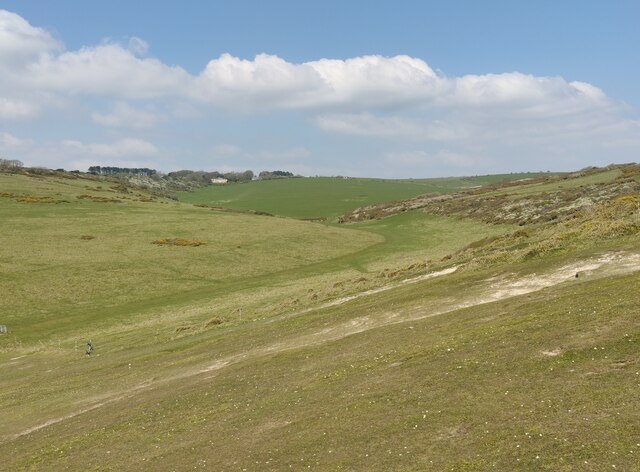A literally earth shaking and earth moving event took place recently at Brass Point in the Seven Sisters Country Park. Thousands of tonnes of rock suddenly fell away from the cliff in a single event. The cliff collapse created a deafening noise and clouds of white dust were seen to fill the air. The debris apron has a typical fan shape as is seen in image
TV5396 : Cliff collapse at Brass Point in the Seven Sisters Country Park. The debris apron of freshly fallen rock contains a mixture of pulverised chalk fragments, freshly broken flints and clumps of soil. As is seen in image
TV5396 : Detailed view of rockfall at Brass Point, East Sussex, the fallen pieces of chalk show characteristic, sharp edges rather than the rounded shapes which are typical of beach, rolled material. A first inspection of the rockfall found there to be few obvious fossils or mineral nodules such as marcasite.
Although the annual rate of erosion at the Seven Sisters is approximately 0.6m per year, that rate has been increasing in recent times. Cliff collapse tends to occur in an episodic way rather than as a constant feature. This cliff fall fits that pattern. The increasing rate of erosion is thought to be a consequence of global warming and climate change.
Neither the Natural Trust nor East Sussex County Council plan to build hard, coastal defences to protect the Seven Sisters. Rather, they plan to let nature take its course and to let the coastline evolve naturally. This would allow natural erosion to provide a supply of beach material to provide cliff defences by absorbing energy from the swash and backwash of the waves. This course of action would also allow new faces of rock to appear and thus the iconic whiteness of the cliffs would be guaranteed.
Some people would prefer that coastal defences were improved while others would like to see fencing at the top of the cliffs put in place as a safety precaution. These are both controversial topics which are open to discussion.
